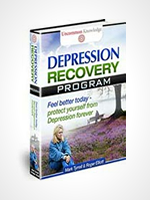Teen Depression
Why is it on the Increase?
Childhood and teen depression is a reality. This is one of the most alarming facts to come from all the research; depression is affecting younger and younger people - adolescents and teenagers. (1) Here we look at why, and what we can do about it.
Twenty years ago depression in children was almost unknown. Now the fastest rate of increase in depression is among young people. Again, this backs up the fact that most depression is not caused by chemical imbalances, whether in adolescents, teenagers or adults.
What we are seeing are changes in society where basic needs (see later in the Depression Learning Path) for companionship, healthy goals, responsibility, connection to others and meaning are not automatically met. Children, adolescents and teens are fed a constant diet of images showing how we are meant to look, sound and be, and told that this is important in life. Meaning is attached to what they have, or look like, rather than what they do, or achieve.
Regardless of our own affluence, we see what those at the 'top' have and are told we should have it too, without thought for the tools or strategies to go about achieving it. During childhood, teenage years and particularly adolescence, pressure to conform with peers can be almost intolerably strong. If children feel different, inadequate or deprived in some way, then depression may result, depending on how they deal with it.
Teen Depression Study
In a recent study by the Queen Elizabeth Medical Centre in Western Australia, of 400 children aged 9 to 12, 16 were found to be clinically depressed, with 112 assessed as being vulnerable to future depression. Depressed children believed that happiness is achieved through the acquisition of fame, money and beauty. Happier children tended to believe that feeling good comes from healthy attitudes and pursuing worthwhile goals.
Teen depression, or bad moods?
Depression in adolescents may be difficult to spot because sulkiness, irritability, antisocial behaviour, negativity and withdrawal often go hand in hand with growing up.
In younger children, depression may present as morbid preoccupation with death and dying. The child may exhibit extreme fear of being separated from a parent or parents and lose interest in participating in games with other children.
As you progress through the Learning Path, you will come to understand clinical depression in a way that allows you to see how children and teens become depressed, just as adults do, and how their depression can be treated in a similar way.
Children and teenagers can been taught specific skills and ways of thinking which can a) help lift depression and b) help prevent relapse. These skills are already being taught in some schools with remarkable results. You will learn more about this as you continue.
Symptoms of Teenage Depression
As well as showing many of the same symptoms of adult depression, some symptoms of teenage depression are:
- A downward trend in performance at school or college.
- Change in personal hygiene and appearance.
- Destructive and/or defiant behavior.
- Hallucinations or unusual beliefs.
- Appetite or weight has changed considerably (has lost or gained a substantial amount of weight)
- May appear restless, agitated (pacing, wringing hands) or has slowed down (e.g., spends hours staring in front, finds it hard to move)
- Has lost a lot of energy, complains of feeling tired all the time.
- Complaints of feeling guilty or worthless ('everything is my fault', 'I am bad')
- Belief that life is not worth living.
Checklist for Teen DepressionYou may find the following checklist useful if you fear you or your teenager/child is depressed. Remember that these points refer to changes in behavior. If you are concerned about your child, speak to them about it, and take them to see your doctor if you are still worried. You can also complete the rest of the Learning Path to ensure you have a good understanding of depression. |
||
|
|
|
|
Of course, many of these behaviors are carried out periodically by perfectly normal teenagers, and must be assessed in context with their normal behavior. |
||
Causes of Teenage, Childhood and Adolescent Depression
In addition to those found in adult depression, causes of teen and childhood depression, or apparent triggers, include additional and often unique situations.
- Social rejection
- Family turmoil
- Failing exams
While the triggers or causes of teenage depression may not appear such major events to many adults, it is the sufferer's perception that is so important.
How important these triggers are to the sufferer is all too evident in the statistics below.
Teenage Depression and Suicide
- Suicide amongst teenagers & young adults has increase 3 fold since 1970. (2)
- 90% of suicide amongst teenagers had a diagnosable mental illness, depression being the most common.
- In 1996 suicide was the 4th biggest killer of 10 to 14 year olds, and the 3rd biggest killer of 15 to 24 year olds.
It is clear that not only are young people becoming more depressed, they are responding to this depression by killing themselves. The high rate of suicide may be due to the intense pressures felt by teenagers, coupled with a lack of life experiences that tell them that situations, however bad, tend to get better with time. They are also less likely to possess more subtle thinking styles, being prone to the more extreme, 'all or nothing' style of thinking. As we will see, this can be a major factor in depression.
People usually kill themselves to escape what they see to be an intolerable and otherwise inescapable situation, not necessarily because they want to die.
Medication for Teenage Depression - Does it Really Work?
- 6 million prescriptions for antidepressants are written for children each year.
- In research, the average age of a depression sufferer studied is 41.
- How relevant are research findings to your average child or teenager?
*** There is no definitive proof that depression medication is an effective treatment for teenage or childhood depression. ***
***In addition, antidepressants should not be given to children (3) as the brain's frontal lobes continue to develop until the age of 20 (4) ***
News (BBC) : June 9, 2003 - Seroxat SSRI no longer to be prescribed to under-18's
News (Telegraph) : Sept 21, 2003 - Effexor (Venlafaxine) no longer to be precribed to under-18's Followed by: June 19, 2003 - FDA rule Paxil not be given to under-18's
News (Guardian) : Dec 10th, 2003 - UK - All SSRI's for under-18's banned, save Prozac
News (Reuters) : Feb 3, 2004 US -Stronger warning about anti-depressants for kids
Despite the staggering amount of antidepressants prescribed to adolescents and teenagers, very little research has been done into their effectiveness. From what research has been done, there is no definitive proof that depression medication is an effective treatment for teen depression.
There are differences in the chemical changes seen in teenage depression sufferers when compared to adults. It is this chemical imbalance that is treated by antidepressants. So, different chemical changes are treated with the same drugs.
In fact there are differences in how teenage and adult brains actually function - the frontal lobe, for example, is still forming up until the age of 20.
Teen Depression Resources
Next article: Major Depression Facts
Now, we move onto some major facts about depression that may well surprise you...
- Lane, R. E. (2000) The Loss of Happiness in Market Democracies. Yale University Press.
- UNICEF (1993) The Progress of Nations. United Nations, 45.
- I Tyrrell & J Griffin (2003), Human Givens. Human Givens Publishing.
- Robertson, I. (1999) Mind Sculpture. Bantam Press.







